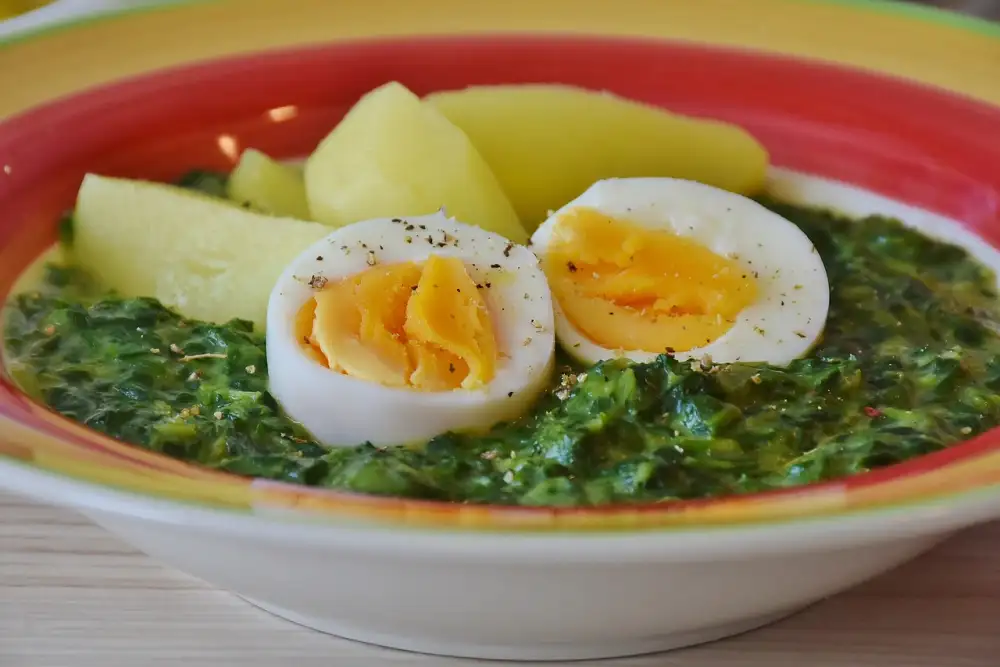Powerful Plant Proteins: Unveiling the Top High Protein Vegetarian Foods for Optimal Health

- Benefits of a High Protein Diet for Vegetarians
- Top Sources of Protein for Vegetarians
- Legumes and Pulses
- Quinoa and Other Whole Grains
- Nuts and Seeds
- Dairy and Dairy Alternatives
- Plant-Based Protein Powders
- Delicious Recipes Using High Protein Vegetarian Foods
- Lentil and Vegetable Curry
- Quinoa Salad with Chickpeas and Avocado
- Nut Butter and Banana Smoothie
- Tips for Incorporating High Protein Vegetarian Foods into Your Diet
For those following a vegetarian diet, getting enough protein can sometimes be a challenge. However, with the right knowledge and food choices, it is entirely possible to meet your protein needs without consuming meat or fish. High protein vegetarian foods are abundant and offer numerous health benefits. In this article, we will explore the top sources of plant-based protein and provide delicious recipes to help you incorporate these foods into your diet. Get ready to discover the power of high protein vegetarian foods for optimal health!
Benefits of a High Protein Diet for Vegetarians
A high protein diet can offer numerous benefits for vegetarians. Firstly, it helps in building and repairing tissues, promoting muscle growth and maintenance. Secondly, it aids in weight management by increasing satiety and reducing cravings. Thirdly, it supports a healthy metabolism and helps regulate blood sugar levels. Additionally, a high protein diet can enhance bone health and improve overall immune function. Lastly, it provides essential amino acids that are necessary for the body's optimal functioning. By incorporating high protein vegetarian foods into your diet, you can enjoy these benefits and maintain a healthy lifestyle.
Top Sources of Protein for Vegetarians
a. Legumes and Pulses: Lentils, chickpeas, black beans, and tofu are excellent sources of protein. They are versatile and can be used in a variety of dishes such as soups, stews, salads, and stir-fries.
b. Quinoa and Other Whole Grains: Quinoa is a complete protein that contains all essential amino acids. Other whole grains like brown rice, oats, and barley also provide a good amount of protein.
c. Nuts and Seeds: Almonds, walnuts, chia seeds, and hemp seeds are packed with protein. They can be enjoyed as snacks or added to smoothies, salads, or baked goods for an extra protein boost.
d. Dairy and Dairy Alternatives: Greek yogurt, cottage cheese, and milk are high in protein. For those who avoid dairy, options like soy milk or almond milk fortified with protein can be great alternatives.
e. Plant-Based Protein Powders: Pea protein powder, hemp protein powder, and brown rice protein powder are popular choices among vegetarians looking to increase their protein intake. These powders can be easily added to smoothies or used in baking.
Incorporating these top sources of plant-based proteins into your diet will ensure you meet your nutritional needs while enjoying a variety of delicious vegetarian meals.
Legumes and Pulses
Legumes and pulses are excellent sources of plant-based protein for vegetarians. These include beans, lentils, chickpeas, and peas. Not only are they rich in protein, but they also provide essential nutrients like fiber, iron, and folate. Incorporating legumes and pulses into your diet can help promote satiety, regulate blood sugar levels, and support heart health. From hearty soups to flavorful salads, there are endless ways to enjoy these nutritious foods in your meals.
Quinoa and Other Whole Grains
Quinoa and other whole grains are excellent sources of plant-based protein for vegetarians. Quinoa, in particular, is a complete protein, meaning it contains all nine essential amino acids that the body needs. It is also rich in fiber, iron, and magnesium. Other whole grains like brown rice, barley, and bulgur are also high in protein and provide a variety of nutrients. Incorporating these grains into your meals can help you meet your daily protein requirements while enjoying their nutty flavors and versatile textures.
Nuts and Seeds
Nuts and seeds are not only delicious but also packed with protein, making them an excellent choice for vegetarians. Almonds, walnuts, cashews, and pistachios are all high in protein and provide essential nutrients like healthy fats and fiber. Similarly, seeds such as chia seeds, flaxseeds, and hemp seeds are rich in protein and omega-3 fatty acids. These versatile ingredients can be enjoyed as a snack on their own or added to salads, smoothies, or baked goods for an extra protein boost. Incorporating nuts and seeds into your diet is a simple way to increase your protein intake while enjoying a variety of flavors and textures.
Dairy and Dairy Alternatives
Dairy products are a great source of protein for vegetarians. Milk, cheese, and yogurt are not only delicious but also packed with essential nutrients. However, for those who follow a vegan or lactose-free diet, there are plenty of dairy alternatives available. Soy milk, almond milk, and oat milk are all excellent options that provide a similar amount of protein as cow's milk. Additionally, tofu and tempeh are versatile plant-based options that can be used in various dishes to increase protein intake. Whether you choose dairy or dairy alternatives, incorporating these foods into your diet will ensure you're getting the protein your body needs.
Plant-Based Protein Powders
Plant-based protein powders are a convenient and versatile option for vegetarians looking to increase their protein intake. Made from sources such as peas, hemp, and brown rice, these powders offer a concentrated dose of protein without the need for cooking or preparation. They can be easily added to smoothies, baked goods, or even mixed with water for a quick protein boost. Plant-based protein powders are not only rich in essential amino acids but also contain fiber and other nutrients that support overall health. Whether you're an athlete or simply looking to meet your daily protein needs, plant-based protein powders are a great addition to any vegetarian diet.
Delicious Recipes Using High Protein Vegetarian Foods
a. Lentil and Vegetable Curry: Cook lentils with a medley of vegetables like carrots, bell peppers, and spinach in a flavorful blend of spices. Serve it over brown rice for a satisfying and protein-packed meal.
b. Quinoa Salad with Chickpeas and Avocado: Combine cooked quinoa with chickpeas, diced avocado, cherry tomatoes, and fresh herbs. Drizzle with a lemon vinaigrette for a refreshing and protein-rich salad.
c. Nut Butter and Banana Smoothie: Blend together almond butter, ripe bananas, almond milk, and a sprinkle of cinnamon for a creamy and protein-packed smoothie that is perfect for breakfast or as a post-workout snack.
These recipes showcase the versatility of high protein vegetarian foods while offering delicious flavors that will satisfy your taste buds.
Lentil and Vegetable Curry
Lentil and Vegetable Curry is a flavorful and protein-packed dish that is perfect for vegetarians. Lentils are an excellent source of plant-based protein, providing about 18 grams per cup. Combined with an array of vegetables like carrots, bell peppers, and spinach, this curry becomes a complete meal. The spices used in the curry, such as turmeric, cumin, and coriander, not only add depth of flavor but also offer health benefits. Turmeric has anti-inflammatory properties while cumin aids digestion. Serve this delicious curry over brown rice or with whole wheat naan for a satisfying and nutritious meal.
Quinoa Salad with Chickpeas and Avocado
Quinoa Salad with Chickpeas and Avocado: This refreshing salad is packed with protein and flavor. Start by cooking quinoa according to package instructions and let it cool. In a large bowl, combine cooked quinoa, drained and rinsed chickpeas, diced avocado, chopped cherry tomatoes, sliced cucumber, and finely chopped red onion. For the dressing, whisk together olive oil, lemon juice, minced garlic, salt, and pepper. Drizzle the dressing over the salad and toss gently to combine. Serve chilled and enjoy this nutritious and delicious high-protein vegetarian dish!
Nut Butter and Banana Smoothie
One delicious and nutritious way to incorporate high protein vegetarian foods into your diet is by enjoying a refreshing nut butter and banana smoothie. This creamy and satisfying drink is packed with plant-based protein from the nut butter, making it an excellent choice for a post-workout snack or a quick breakfast on the go. Simply blend together a ripe banana, a tablespoon of your favorite nut butter (such as almond or peanut butter), a cup of plant-based milk (such as almond or soy milk), and a handful of ice cubes. For an extra boost of protein, you can also add a scoop of plant-based protein powder. Blend until smooth and creamy, then pour into a glass and enjoy the creamy goodness. This smoothie not only provides you with a powerful dose of protein but also delivers essential nutrients like potassium, fiber, and healthy fats. So, sip on this tasty smoothie and fuel your body with the power of plant proteins!
Tips for Incorporating High Protein Vegetarian Foods into Your Diet
1. Plan your meals: Make a weekly meal plan that includes high protein vegetarian foods. This will help you stay organized and ensure you have all the necessary ingredients on hand.
2. Experiment with recipes: Try out new recipes that feature high protein vegetarian foods. This will keep your meals interesting and prevent you from getting bored with your diet.
3. Snack smart: Keep protein-rich snacks like roasted chickpeas, edamame, or Greek yogurt handy for when hunger strikes between meals.
4. Opt for plant-based protein powders: If you struggle to meet your protein needs through whole foods alone, consider incorporating plant-based protein powders into your diet. They can be easily added to smoothies or used in baking.
5. Be mindful of portion sizes: While high in protein, some vegetarian foods can also be calorie-dense. Pay attention to portion sizes to ensure you're not overeating and consuming excess calories.
6. Combine complementary proteins: To ensure you're getting all the essential amino acids, combine different sources of plant proteins throughout the day. For example, pair beans with rice or lentils with quinoa.
7. Get creative with substitutions: Explore alternative options for meat in your favorite dishes by using tofu, tempeh, or seitan as substitutes. These plant-based proteins can add variety and flavor to your meals.
By following these tips, you can easily incorporate high protein vegetarian foods into your diet and enjoy their numerous health benefits while still enjoying delicious and satisfying meals.
In conclusion, incorporating high protein vegetarian foods into your diet is a powerful way to enhance your overall health and well-being. These plant-based protein sources offer numerous benefits such as promoting muscle growth, aiding in weight management, and providing essential nutrients. By embracing these foods, you can enjoy a flavorful and nutritious lifestyle while reaping the rewards of optimal health. So why wait? Start exploring the world of high protein vegetarian foods today and unlock the potential for a healthier you!
Published: 20. 12. 2023
Category: Health



